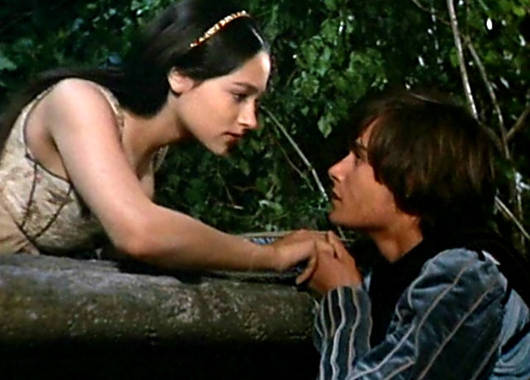
This is still a story about the impetuousness of young love about the purity, the tragedy, the violence of love. The play’s original dialogue – iambic pentameter and all – is retained, mostly word-for-word, although naturally large swathes are omitted to accommodate a two-hour running time. It’s critical to note that, for all the boldness of this adaptation, Luhrmann’s film is still fundamentally Romeo and Juliet. What It’s Really About The Standard Stuff "The film’s aggressively untraditional approach holds true to the populist spirit of the Bard, if not to the letter." Luhrmann’s intent was, in his own words, to tell “a Shakespearean story the way Shakespeare would have presented the material when he was at the Globe Theatre.” The dizzying blend of comedy, tragedy, romance and action – not to mention an extravagant style paying homage to Spaghetti Westerns, musicals, gang movies and melodrama in roughly equal measure – arguably hews closer to Shakespeare’s works than more classical approaches. The film’s aggressively untraditional approach holds true to the populist spirit of the Bard, if not to the letter. Its hyper-stylised contemporary setting – described by Luhrmann as a “hybrid of Miami and Brazil” – and kinetic cinematography - regularly characterised as “MTV-style filmmaking” – has aged remarkably well… unlike much of that era’s pop culture. Perhaps most importantly, Romeo + Juliet remains an accessible and exhilarating adaptation almost two decades on.


#All type of romeo and juliet movies movie#
Watch The Movie Show original ★★★★★ review of Romeo + Juliet

Alongside such pockets of critical praise came awards recognition: a Silver Bear for DiCaprio and an Alfred Bauer Prize for Luhrmann at Berlinale a BAFTA Award for Best Director Academy Award nominations for Best Art Direction and Best Set Direction for Catherine Martin and Brigitte Broch. Australia’s chief critics were significantly more enthusiastic on The Movie Show (see below), Margaret Pomeranz described the film as “simply stupendous” David Stratton called it “a tremendously bold vision.” Each warranted it worthy of five stars. America’s pre-eminent film critic, Roger Ebert, gave it two out of four stars, lamenting “the desperation with which it tries to 'update' the play and make it “relevant””. With a contemporary setting, soundtrack and a hot young cast led by Leonardo DiCaprio and Claire Danes, Luhrmann’s second feature captured the attention of audiences, grossing roughly $150 million internationally. Australian director Baz Luhrmann’s 1996 film, Romeo + Juliet, is neither the most recent nor – by any stretch – the most faithful adaptation of the play, but it is arguably the most successful. Each generation gets its own Romeo and Juliet, just as Shakespeare himself adapted his original play from an Italian novella and a long tradition of tragic romances before it. Of course, the movie also throws in all the usual teen rom-com staples: A high-school dance, awkward poetry, and a date at a paintball arena (as well as the slightly less customary erotica-writing guidance counselor).A story as archetypal as Shakespeare’s Romeo and Juliet demands adaptations. The film uses many of the same names, like Kat for (Katherina) and her younger sister Bianca, and manages to sneak in a few Shakespearean quotes: "I burn, I pine, I perish," says Joseph Gordon Levitt's Cameron, who is in love with Bianca. The 1999 adaptation of The Taming of the Shrew stars Heath Ledger as a bad boy who is paid to woo Julia Stiles, the "shrew," so that her father will allow her younger sister to date. Though Scar still dies, it's at the hand of his former hyena minions, and not Simba himself.ĭefinitely not in the original: Hakuna Matata In The Lion King, Simba has a happy ending and retakes the throne with the help of Nala. Where the two versions differ the most - apart from the singing animals, of course - is the ending. The scheming uncle who murders the young prince's father (Claudius/Scar), the appearance of the dead king as a ghost (King Hamlet/Mufasa), the prince's strange friends who serve as comic relief (Rosencrantz and Guildenstern/Timon and Pumba).

There is some debate over whether The Lion King's resemblance to Hamlet was intentional, but it's hard to ignore the parallels.


 0 kommentar(er)
0 kommentar(er)
